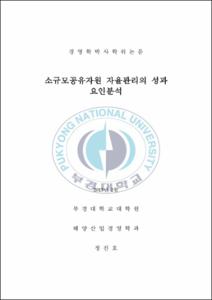소규모공유자원 자율관리의 성과요인분석
- Alternative Title
- An Analysis of Performance Factors in Small Scale Common-Pool Resource's Self-Organization
- Abstract
- Fishery resources are becoming the most important subject of interest in fishery policy with the typical Common-Pool Resources(CPR) having features of the self- renewable resources and small-scale operations.
This study has drawn situational variables affecting on judgement factors and such factors indicated the degree of successful operation targeting self management communities using the village fishery ground which can be called representative small-scale pool resources of coastal fishing ground, and the purpose is that the drawn variables grasp the causal relationship affecting by judgement factors.
In order to achieve the purpose of this study, I have arranged the systematic equipment affecting the small scale pool resource management of the self management communities of the village fishery utilizing design principle confirmed from the long-standing pool resource system and institutional analysis framework presented by Ostrom(1990), and carried out in path analysis to confirm causal relationship using a survey and statistical data.
It was found by increase in income, increase of unity and participation, the increase of fishery resource, level of awareness, satisfaction, participants, as judgement factors which can determine the successful operation and management of self management communities in depth interviews investigating, and analyzed that increase of satisfaction and participants did not affect the analysis of causal relations and results, and the high impact factors affected in the successful operation management was analyzed that increase in income and fishery resources increase.
These results show that the purpose of self management community is the increase in income of community member through the fishing ground management.
In particular, the increase in income has high impact on the market situation, the community leader, the status of fishing ground. Because the variables which fishery environment can not be controlled from a single community in the self management community activities, on that higher impact on the state of the fisheries in the activities of the self management communities, it should be focused on the fishery environment improvement and fishery resource composition planning.
This study has the limitations that have generalized from the whole of our country's self managed fishery apropos of the village fishing communities and used the basic data based on respondents recognition by a survey rather than substantial figures in the analysis.
In the analysis of the causal relationship. Nevertheless, there is a meaning that suggests new research directions by estimating quantitative the causal relationship beyond qualitative cases apropos of minority communities which was mainly used in the existing preceding research.
- Issued Date
- 2013
- Awarded Date
- 2013. 2
- Type
- Dissertation
- Publisher
- 부경대학교
- Affiliation
- 부경대학교 대학원
- Department
- 대학원 해양산업경영학과
- Advisor
- 박성쾌
- Table Of Contents
- 제1장 서론 1
제1절 연구 필요성 및 목적 1
제2절 연구 방법 및 범위 4
제2장 선행연구 검토 7
제1절 공유자원 및 자율관리어업 관련 연구 7
제2절 분석모형 관련 연구 11
제3장 이론적 배경 13
제1절 공유자원의 관리 필요성 13
1. 공유자원의 특성 13
2. 공유자원의 관리 필요성 15
제2절 공유자원의 제도 분석모형 20
1. 제도적 분석틀 개념 20
2. 제도분석틀의 상황변수 23
3. 자율적 관리의 설계원칙 25
제3절 연구대상의 제도론적 검토 29
1. 마을어업의 공유자원 특성 29
2. 마을어업 공동체의 제도론적 검토 32
제4장 자율관리어업 현황 34
제1절 자율관리어업 현황 34
1. 개념 및 목적 34
2. 자율관리어업 참여 현황 40
제2절 자율관리어업 기관별 역할 41
1. 자율관리어업 기관별 역할 41
2. 자율관리 지원사업 현황 42
제5장 분석 기초자료 45
제1절 조사의 개요 45
제2절 심층면담조사 48
1. 조사대상 현황 48
2. 판단요인 도출 49
3. 상황변수 도출 50
4. 설계원칙 검토 51
제3절 공동체 설문조사 58
1. 설문조사 현황 58
2. 표본 기초통계 59
3. 설계원칙 검토 61
제6장 실증분석 68
제1절 실증모형설정 68
제2절 추정내용 및 추정결과 70
1. 경로의 설정 70
2. 추정결과 78
제7장 결론 93
참고문헌 96
부록. 조사 설문지 98
- Degree
- Doctor
- Files in This Item:
-
-
Download
 소규모공유자원 자율관리의 성과요인분석.pdf
기타 데이터 / 2.61 MB / Adobe PDF
소규모공유자원 자율관리의 성과요인분석.pdf
기타 데이터 / 2.61 MB / Adobe PDF
-
Items in Repository are protected by copyright, with all rights reserved, unless otherwise indicated.